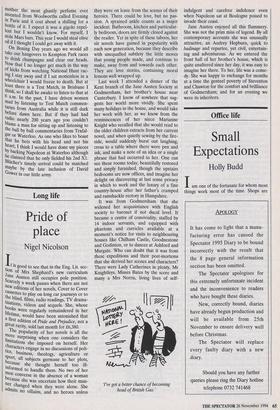Long life
Pride of place
Nigel Nicolson
It is good to see that in the Eng. Lit. sec- t'" of Mrs Shephard's new curriculum , Jane Austen still occupies pole position. Scarcely a week passes when there are not new editions of her novels, Cover to Cover cassettes to play on long car journeys or to the blind, films, radio readings, TV drama- tisations videos and sequels. She, whose b°0 were regularly remaindered in her lifetime, would have been astonished that a first edition of Pride and Prejudice, not a great rarity, sold last month for £6,380. The popularity of her novels is all the more surprising when one considers the limitations she imposed on herself. Her characters engage in no discussions of poli- tics, business, theology, agriculture or sport, all subjects germane to her plots, because she thought herself too ill- informed to handle them. No two of her men converse M the absence of a woman because she was uncertain how their man- ner .changed when they were alone. She admits no villains, and no heroes unless they were on leave from the scenes of their heroics. There could be love, but no pas- sion. A sprained ankle counts as a major incident. Bathroom, kitchen and particular- ly bedroom, doors are firmly closed against the reader. Yet in spite of these taboos, her six novels have gained in popularity with each new generation, because they describe with unequalled subtlety the little moves that young people made, and continue to make, away from and towards each other. They are love stories, containing moral lessons well wrapped up.
Last week I attended a dinner of the Kent branch of the Jane Austen Society at Godmersham, her brother's house near Canterbury. I know of nowhere that sug- gests her world more vividly. She spent many holidays in the house, and would take her work with her, as we know from the reminiscences of her niece Marianne Knight who recalled that she would read to the older children extracts from her current novel, and when quietly sewing by the fire- side, would suddenly burst out laughing, cross to a table where there were pen and ink, and make a note of an idea or a single phrase that had occurred to her. One can see these rooms today, beautifully restored and simply furnished, though the upstairs bedrooms are now offices, and imagine her delight on discovering at last some privacy in which to work and the luxury of a fine country-house after her father's cramped and ramshackle rectory in Hampshire.
It was from Godmersham that she widened her acquaintance with English society to baronet if not ducal level. It became a centre of conviviality, staffed by 14 indoor servants, and equipped with phaetons and curricles available at a moment's notice for visits to neighbouring houses like Chilham Castle, Goodnestone and Godinton, or to dances at Ashford and Margate. Who can doubt that it was from these expeditions and their post-mortems that she derived her scenes and characters? There were Lady Catherines in plenty, Mr Knightleys, Misses Bates by the score and many a Mrs Norris, living lives of self- I've got a better chance of becoming head of British Gas.' indulgent and carefree indolence even when Napoleon sat at Boulogne poised to invade their coast.
Jane Austen enjoyed all this flummery. She was not the prim miss of legend. By all contemporary accounts she was unusually attractive, an Audrey Hepburn, quick to badinage and repartee, yet civil, entertain- ing and adventurous. As we entered the front hall of her brother's house, which is quite unaltered since her day, it was easy to imagine her there. To her, life was a come- dy. She was happy to exchange for months at a time the genteel poverty of Steventon and Chawton for the comfort and brilliance of Godmersham; and for an evening we were its inheritors.










































































 Previous page
Previous page